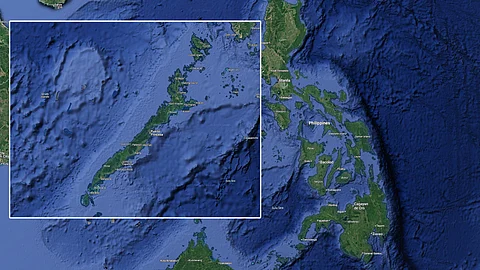
- NEWS
- the EDIT
- COMMENTARY
- BUSINESS
- LIFE
- SHOW
- ACTION
- GLOBAL GOALS
- SNAPS
- DYARYO TIRADA
- MORE

An advocacy leader reaffirmed on Monday that Palawan is unquestionably part of the Philippines, calling China’s claim that it historically belonged to them an audacious distortion of history.
In a series of social media posts, Chinese sources alleged that Palawan was once “Zheng He Island”, supposedly named after a Chinese explorer. The Armed Forces of the Philippines (AFP) dismissed the assertion as propaganda.
"It's very well known that they (really) come out with a lot of propaganda materials," AFP spokesperson Col. Francel Margareth Padilla said in a television interview.
Supporting the AFP’s position, Dr. Jose Antonio Goitia, chairman emeritus of the People’s Alliance for Democracy and Reform, Liga Independencia ng Pilipinas, and Alyansa ng Bayan para sa Kapayapaan at Demokrasya, emphasized that China’s claim directly contradicts the United Nations Convention on the Law of the Sea (UNCLOS) and fundamental principles of sovereignty.
"The Philippines must respond decisively with enhanced maritime patrols, a strengthened military presence, diplomatic protests, and deeper alliances with regional and global partners to counter China’s revisionist claims and expansionist agenda," Goitia stated during a forum.
He pointed out that China has long sought to expand its reach in the South China Sea by selectively using historical narratives to justify its territorial ambitions. Recently, Beijing asserted that Palawan and other territories in the West Philippine Sea historically fell under Chinese influence, citing ancient voyages and outdated maps.
Goitia stressed the undisputed legitimacy of Philippine sovereignty over Palawan, explaining that UNCLOS, which China ratified in 1996, upholds the Philippines' exclusive rights over its territorial waters and exclusive economic zone (EEZ).
"Palawan is an integral part of the Philippine archipelago. Under UNCLOS, which China ratified in 1996, coastal states have full sovereignty over their archipelagic waters, territorial sea, exclusive economic zone (EEZ), and continental shelf. Palawan’s surrounding waters, including the West Philippine Sea, fall squarely within the Philippines’ EEZ and continental shelf, granting the nation exclusive rights over maritime resources, fisheries, and hydrocarbon reserves," he said.
He also refuted China's claim that Palawan was once named “Zheng He Island”, emphasizing that international law does not recognize sovereignty based on ancient exploration or historical narratives but rather on effective control, governance, and legal recognition.
Citing the 2016 ruling of the Permanent Court of Arbitration (PCA), Goitia reminded that historical claims alone do not establish sovereignty or maritime entitlements. The ruling rejected China’s sweeping assertions over the South China Sea, affirming that sovereignty must be based on recognized legal frameworks, not unilateral reinterpretations of history.
Beyond its maritime significance, Palawan serves as a strategic military bulwark in the West Philippine Sea.
"Palawan is not just a resource-rich province; it is the Philippines' frontline defense against foreign aggression," Goitia emphasized.
He warned that China’s claim over Palawan is not just about maritime resources but also a direct challenge to the Philippines' military posture and regional security architecture. This strategy mirrors Beijing's tactics in enforcing its discredited nine-dash line claim.
Under UNCLOS, sovereignty cannot be established through unilateral declarations or revisionist historical claims but must be backed by recognized legal processes.
Goitia further exposed China's aggressive tactics as part of its broader strategy to dominate the South China Sea.
"China employs military intimidation, economic leverage, and diplomatic coercion to weaken the legitimate claims of other nations," he asserted. "It has consistently disregarded international norms by constructing artificial islands, militarizing disputed areas, and harassing Filipino fishermen within Philippine waters."
These actions, he stressed, constitute blatant violations of Philippine sovereignty and a clear breach of international law.
He underscored the urgency for the Philippines to reinforce its defense posture and assert its legal rights on the international stage.
"China’s expansionist ambitions threaten not just Philippine sovereignty but also regional stability and freedom of navigation in one of the world’s most critical trade routes," he warned.
As China continues its aggressive maneuvers, Goitia urged the Philippine government to respond with unwavering resolve.
"As China intensifies its aggressive maneuvers, the Philippines must respond with unwavering resolve. By reinforcing its military presence, strengthening alliances, and standing firm on international law, the nation can effectively counter Beijing’s attempts to rewrite history and undermine Philippine sovereignty," Goitia concluded.
